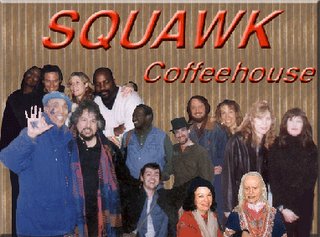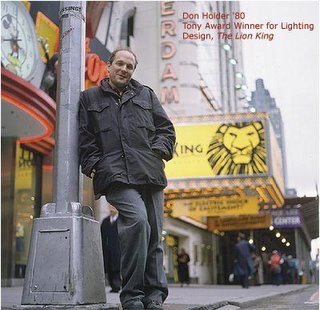
Somerville Artists Lee Kidd and Jessa Piaia Continue to “Squawk”
Lee Kidd and Jessa Piaia are Somerville artists who like many Somerville artists engage in a labor of love. Every Thursday night (9PM) at the Harvard Epworth Church in Harvard Square (1555 Mass. Ave) in Cambridge, Mass. they run the venerable Squawk Coffeehouse. This is an eclectic venue of poetry and music that has been around in one form or the other since 1989. Lee Kidd, founder of Harvard Square’s “International School of Foreign Language,” and actress and Harvard University employee Jessa Praia, as well as cartoonist Mick Cusimano, and “Poet’s Theatre,” host Richard Cambridge, are the cabal that has kept this series running all these years.
Squawk had notable guests over the years such as: Ed Sanders, John Sinclair, Tuli Kupferberg and Herschel Silverman. Many musicians have cut their teeth here like: Mary Lou Lord, Vance Gilbert and Ellis Paul. Squawk is also the name of a magazine that is associated with the venue. “Squawk” continues to be a destination for tourists and locals who need strong doses of no-nonsense music and poetry in the heart of Harvard Square.
Doug Holder: If you had to give the mission statement of”‘Squawk,” what would that be?
Lee Kidd; Well, inside of the “Squawk” magazine cover in every issue we give a little manifesto. It’s actually by “Fact Sheet Five,” and it says: “An open mic in print.” It means we are in print. We are not a hard cover book operation, but we are better than a napkin people write on. And we put in new stuff in our magazine.
Jessa Praia: We always encourage people to work on new stuff. We want them to showcase their talent every week. They should not be afraid to take chances. It is a receptive audience.
DH: How is your venue different from all the others in the area?
LK: Well that’s real direct and real easy. We are a coffeehouse. We serve really good coffee and it comes with the $3 admission. A coffeehouse has an open mic, but it also has music, discussion, etc… A coffeehouse is unpredictable.
DH: Has anything really bizarre happened at “Squawk?”
LK: Quite bizarre…yes. Once we had a gentleman who stripped himself naked and hung himself up on a cross. It was part of his act…he was also talking to his girlfriend.
JL: There was a woman who participated once who had nothing on but a bridal veil that was down to her ankles.
DH: Lee. You told me you had a poem published in “The New Yorker,” but essentially published nothing since. Do you ever plan to?
LK: I have never really sent out anything in my life. The way I got into “The New Yorker,” was when I went to the “Beat Literature Conference,” down in N.Y.C. As we were out there we just met David Amram for the first time (musician cohort of Jack Kerouac etc…), and a woman was handing out pieces of paper that said: “Write a Haiku For “The New Yorker.” I just scribbled out something. I wrote a Haiku. I gave it to the lady. She took my picture, and that was that. Three weeks later when I just got back from Prague, I was in the Café Pamplona in Harvard Square and the waiter said: “You’re in “The New Yorker!”
I don’t send stuff around, but I keep writing. Probably I’ll put my poems in chapbooks.
DH: Jessa. I am told you are an actor. What kind of acting do you do?
JP: I am a character actor. In the early 90’s I developed a series of historical characters. I called them ‘Women in History.’ There are seven characters that span the time from colonial to contemporary times. Each of these women made a contribution to the greater good. They were also connected to the state of Massachusetts. They were born here, or did their significant work here. Amelia Earhart was one. She had strong Boston connections. She is the most contemporary one. Susan B. Anthony, the Suffragist, who was born in Massachusetts, is another.
DH: Tell me about “Squawk” magazine
JP: We put out 58 issues. Our 58th issue came out in Oct 2006. We initially published something that reported what was going on in the coffeehouse. It started small, but came out frequently. It started out twice-a-week. It was small format. We went to large format. It has gone on for years, and got better and better. We collected poems from our friends, and people who came to the open mic. Then we went to NYC for the “Small Press festival.” People bought “Squawks.” It was always well-received. We believe that “Squawk” will live long after we are gone. They are like time capsules of what was going on.
DH: You went to Harvard. When I interviewed the late Robert Creeley at “the Wilderness House Literary retreat”
http://www.wildernesshouse.org/ he told me found the Harvard experience a negative one. He said he experienced snobbery, indifferent professors, etc… I have heard this from other poets as well. What was your experience?
LK: I was a graduate student. When I got to Harvard I was in Harvard Divinity School. This was the late 60’s. There were all kinds of actions going on that were positive and disruptive…and good. I never found a dull moment. I’m from West Virginia, and I feared snobbery from the East, but I had a good experience.
DH: Did you know "Brother Blue" at Harvard?
LK:I went to school with the storyteller “Brother Blue.” He was just as he is now. We met in 1967 on the checkout line at the Harvard Coop. My life would be less of one if I didn’t know Brother Blue.
Doug Holder. * Doug Holder will be reading from his poetry collection “Wrestling With My Father,” Feb. 23 at Squawk.








































